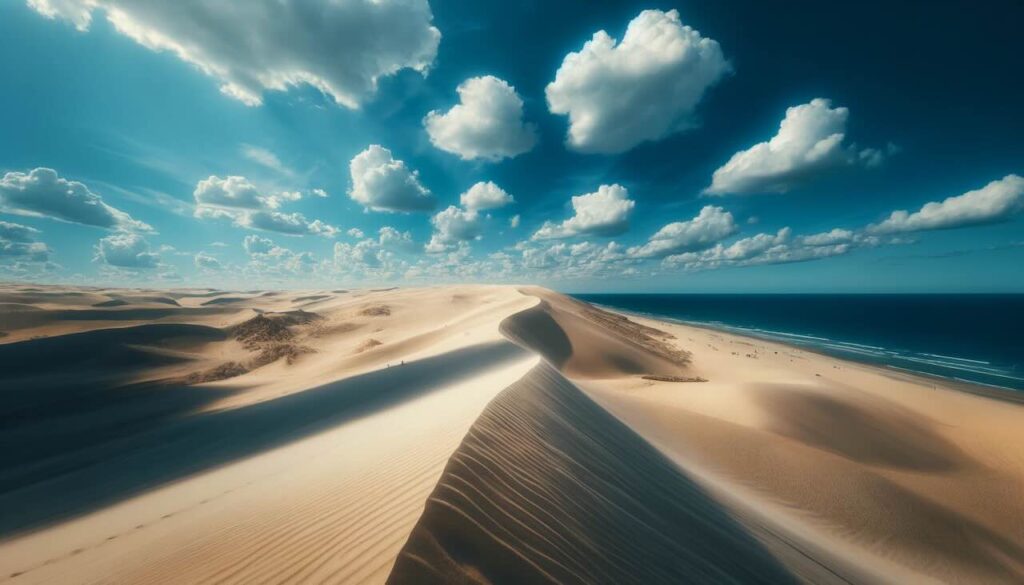When travelers think of Japan’s natural wonders, they often picture snow-capped mountains, serene forests, or coastal cliffs. But on the coast of Tottori Prefecture lies a dramatically different—and often surprising—landscape: the Tottori Sand Dunes (鳥取砂丘), Japan’s largest sand dune system.
While these dunes have existed for millennia, they now face an unexpected environmental challenge that threatens their iconic appearance: the problem of greening. Let’s explore how these vast sand hills formed, and why keeping them “barren” is surprisingly difficult.
How the Tottori Sand Dunes Were Formed: A 100,000-Year Story
Unlike the vast deserts of Africa or Central Asia, the Tottori Sand Dunes are the result of geological and climatic forces unique to Japan’s coastal geography. Their formation spans tens of thousands of years:
1. River-Borne Sediment
- Sediment from rivers like the Sendai River and Tenjin River flows into the Sea of Japan.
- These rivers carry sand eroded from mountains inland, slowly depositing it into coastal waters.
2. Ocean Currents and Wave Action
- Ocean currents and wave activity redistribute the deposited sand, pushing it toward the shoreline.
3. Seasonal Winds Shape the Landscape
- Powerful seasonal winds from Siberia, particularly in winter, pick up the beach sand and carry it inland.
- Over thousands of years, these winds gradually built the towering sand dunes we see today.
4. An Ongoing Natural Process
- The dunes remain geologically active, with shifting sands continually reshaped by wind patterns and coastal weather.
- The Tottori Sand Dunes today stretch approximately 16 kilometers long and 2 kilometers wide, creating a uniquely dramatic coastal vista within Japan.
The Greening Problem: Why Are Japan’s Sand Dunes Turning Green?
While the dunes appear stark and barren, they are surprisingly fragile ecosystems that depend on continuous movement. In recent decades, scientists and conservationists have observed a troubling trend: the spread of vegetation threatening the open dune landscape.
Causes of the Greening
- Windborne Seeds: Seeds from nearby vegetation blow into the dunes and take root.
- Human Activity: Increased tourism, afforestation in surrounding areas, and changing land use have altered wind patterns and increased nutrient availability.
- Climate Change: Warmer temperatures and shifting rainfall patterns have made conditions more hospitable for plants.
- Sedge Proliferation: Fast-spreading plants like sedge (カヤツリグサ科) stabilize the sand, further accelerating greening.
Why Greening Is a Problem
Though “greening” might sound positive, it poses serious challenges for the health of the dunes:
- Loss of landscape uniqueness: The dramatic, sweeping dunes are a rare sight in Japan and a valuable tourism draw.
- Disruption of natural sand movement: Stabilized sand prevents the dunes from shifting, harming the dynamic ecosystem.
- Threat to native dune species: Some plants and insects rely on open sand habitats that vanish when vegetation takes hold.
In short, greening transforms a living dune system into a static, shrinking one.
Efforts to Preserve the Tottori Sand Dunes
Recognizing the risk, local governments, scientists, and volunteers have launched multi-faceted conservation efforts:
1. Manual Removal of Invasive Plants
- Teams of staff and volunteers regularly uproot invasive grasses, shrubs, and sedges.
- Annual “weeding events” invite public participation in dune preservation.
2. Encouraging Sand Flow
- Controlled thinning of nearby forests restores wind flow across the dunes.
- In some cases, minor excavation and sand redistribution help reactivate dune movement.
3. Research and Monitoring
- Ongoing scientific studies track the ecological balance of the dunes and model future scenarios under climate change.
4. Public Education and Awareness
- Visitors are educated on responsible tourism, including staying on designated paths to minimize human impact.
- Local exhibits and museums explain the natural and cultural significance of the dunes.
A Balancing Act: Nature, Tourism, and Conservation
The Tottori Sand Dunes are both a natural wonder and an important cultural and economic resource for the region. Tourism brings vital revenue, but it must be carefully managed to avoid contributing to further greening.
By promoting eco-friendly tourism, educating visitors, and combining scientific management with community engagement, Japan hopes to preserve this unique landscape for future generations.
The Global Rarity of Coastal Dune Preservation
What makes the Tottori Sand Dunes especially notable is how rare active coastal dune systems are globally—especially in highly populated and industrialized nations like Japan. In that sense, preserving the dunes is not only a local priority but also part of a global responsibility to protect rare geological features.
Summary
The Tottori Sand Dunes stand as one of Japan’s most unique natural landscapes—a living testimony to thousands of years of geological forces at work. Yet their continued existence depends not on nature alone, but on delicate human stewardship. The surprising greening problem serves as a reminder that even barren landscapes can be fragile, requiring active conservation to preserve their dynamic beauty.
For visitors, the dunes offer more than picturesque views—they present a living lesson in how nature, history, and human care intersect. As we walk these windswept hills, we are not just admiring a landscape, but participating in its ongoing story.


